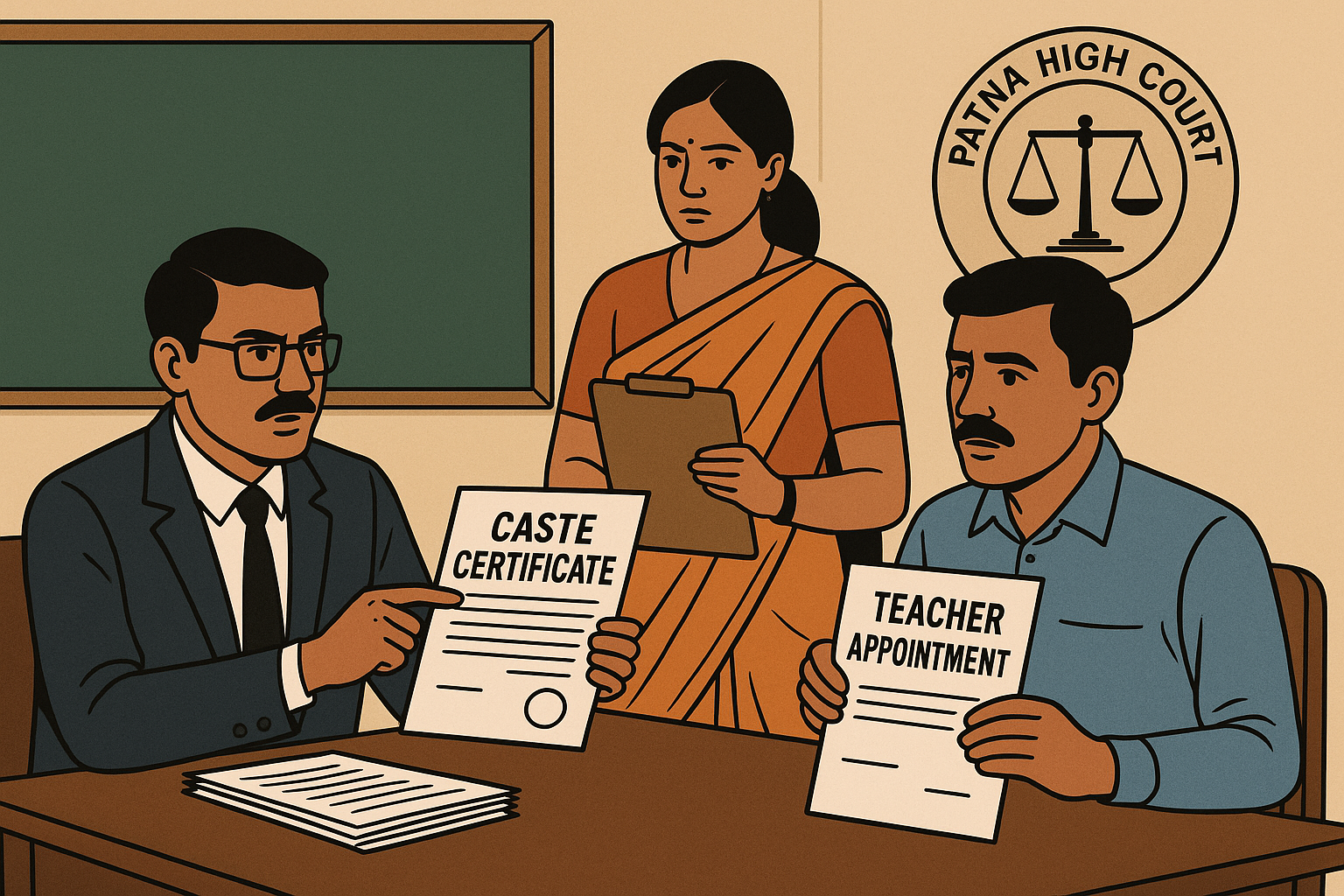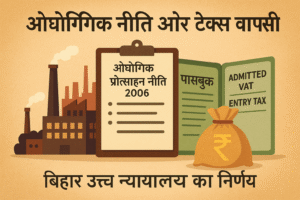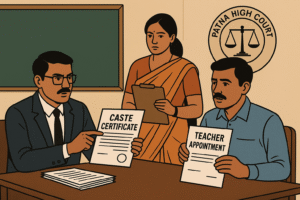Simplified Explanation of the Judgment
The Patna High Court, in a detailed judgment dated 14 August 2020, held that a teacher’s eligibility certificate obtained under false pretences of belonging to a reserved category was illegal and void. The Court set aside the appointment of the said teacher (Respondent No. 11) and restored the selection of the genuine candidate (the petitioner).
The case was heard by Hon’ble Mr. Justice Mohit Kumar Shah in Civil Writ Jurisdiction Case No. 8953 of 2018.
Background
The petitioner, a qualified candidate from Bagaha, West Champaran, had passed matriculation, intermediate, and B.A. (Geography Hons.) and later cleared the Bihar Elementary Teachers Eligibility Test (BETET) 2011 conducted by the Bihar School Examination Board.
He applied for appointment as Block Teacher (Classes VI–VIII) in 2012 under the Backward Class (BC) category. However, he was denied selection because another candidate — the private respondent (Respondent No. 11) — was appointed under the same reserved category.
The petitioner challenged this before the District Appellate Authority (DAA), which found that Respondent No. 11 had fraudulently claimed to be a resident of Bihar and belonged to a backward class, despite being a native of Uttar Pradesh.
The DAA, by order dated 9 September 2016, declared that Respondent No. 11 could not be treated as a BC candidate from Bihar and directed that the petitioner be considered instead.
Appeal Before State Appellate Authority
Respondent No. 11 appealed the DAA’s order before the State Appellate Authority, Education Department, Patna, in Appeal No. 51/2017.
He claimed that:
- He had purchased 0.04 decimals of land in Bihar in 2010.
- He later obtained a residential certificate (28.05.2012) and caste certificate (24.02.2012) from the Circle Officer, Bagaha-II.
- After purchasing land and obtaining an electricity connection, he became a resident of Bihar.
The State Appellate Authority accepted this claim, held that the term “resident of Bihar” did not necessarily mean “permanent resident,” and allowed his appeal on 18 April 2018.
Following this, his appointment was reinstated, and the petitioner’s selection was cancelled.
Petitioner’s Challenge Before High Court
The petitioner filed the present writ petition before the Patna High Court, arguing that:
- The respondent’s BETET-2011 application was fraudulent since he did not possess any caste or residential certificate at the time of the exam.
- The respondent belonged to Uttar Pradesh, as proved by his name in the 2015 voter list of Siswa (UP).
- Merely purchasing land in Bihar does not make someone a “resident of Bihar” under law.
- The respondent’s caste certificate was issued after the examination, making his claim retrospective and invalid.
He relied on landmark Supreme Court judgments such as:
- Bir Singh v. Delhi Jal Board, (2018) 10 SCC 312 — holding that a person’s caste status in one State cannot be transferred to another State.
- S. Pushpa v. Sivachanmugavelu, (2005) 3 SCC 1 — a migrant SC/ST of another State cannot claim reservation in the State of migration.
- Chandigarh Administration v. Surinder Kumar, (2004) 1 SCC 530 — reservation benefits depend on the recognition by the State concerned.
- Baleshwar Prasad Rajak v. State of Bihar, 2009 (2) BLJ 160 — origin, not residence, determines caste-based eligibility in Bihar.
Respondent’s Defence
The private respondent argued that:
- There was no bar in the BETET exam rules against non-residents of Bihar appearing.
- He had purchased land, built a small house, and obtained necessary certificates before appointment.
- His documents were validly issued by competent authorities.
Court’s Analysis and Findings
Justice Mohit Kumar Shah made a clear distinction between:
- Eligibility to appear in BETET, and
- Eligibility to claim reservation benefits in Bihar.
The Court found:
- BETET Eligibility:
There was indeed no rule barring non-residents from appearing in the BETET exam. - Reservation Claim:
The brochure required that applicants “be a citizen of India and resident of Bihar” to claim reserved category benefits. The last date to apply was 10 June 2011, but the respondent obtained his caste certificate only on 24 February 2012 — several months after the exam. - Fraudulent Representation:
Since the respondent misrepresented his caste status to claim BC reservation in Bihar without having a valid certificate, his BETET qualification was declared invalid and fraudulent. - Effect on Appointment:
As the appointment was based on an invalid certificate, the respondent was not qualified for the teacher’s post. His selection under the BC category was thus illegal.
The Court emphasized that a person’s reserved category status does not automatically carry over from another State, citing the Supreme Court’s Bir Singh and Baleshwar Prasad Rajak rulings.
Final Judgment
- The High Court quashed the order of the State Appellate Authority dated 18.04.2018.
- The BETET certificate of Respondent No. 11 was declared illegal, invalid, null, and void.
- The order cancelling the petitioner’s appointment and reinstating Respondent No. 11 (dated 05.05.2018) was also quashed.
- The writ petition was allowed in full, restoring the petitioner’s valid appointment.
Significance or Implication of the Judgment
- Fraud vitiates eligibility: Candidates who misrepresent their domicile or caste category lose all benefits of selection, even after appointment.
- Clarifies scope of residence: Merely owning land does not make one a “resident” for reservation purposes.
- Prevents misuse of State-specific reservation: Ensures that benefits meant for Bihar’s backward communities are not diverted to outsiders.
- Protects genuine candidates: Reinforces fair recruitment and accountability in teacher appointments.
Legal Issue(s) Decided and Court’s Reasoning
- Can non-residents claim reservation benefits in Bihar?
❌ No. Reservation benefits are confined to original residents of Bihar’s backward classes. - Was the respondent’s BETET certificate valid?
❌ No. It was obtained through false representation before possessing valid certificates. - Was the State Appellate Authority justified in restoring his appointment?
❌ No. It ignored the fraud and misrepresentation involved. - Is residence created by land purchase sufficient for reservation?
❌ No. It does not change a person’s State of origin for caste-based benefits.
Judgments Referred by Parties
- Bir Singh v. Delhi Jal Board, (2018) 10 SCC 312
- S. Pushpa v. Sivachanmugavelu, (2005) 3 SCC 1
- Chandigarh Administration v. Surinder Kumar, (2004) 1 SCC 530
- Baleshwar Prasad Rajak v. State of Bihar, 2009 (2) BLJ 160
Judgments Relied Upon or Cited by Court
- Bir Singh v. Delhi Jal Board, (2018) 10 SCC 312
- Baleshwar Prasad Rajak v. State of Bihar, 2009 (2) BLJ 160
Case Title
Arvind Kumar v. State of Bihar & Ors.
Case Number
Civil Writ Jurisdiction Case No. 8953 of 2018
Citation(s)
2021(3) PLJR 62
Coram and Names of Judges
Hon’ble Mr. Justice Mohit Kumar Shah
Names of Advocates and Appearance
- For Petitioner: Mr. P.K. Shahi, Sr. Adv.; Mr. Zainul Abedin, Adv.
- For Respondent No. 11: Mr. Awdhesh Kumar Mishra, Mr. Pratap Sharma, Mr. Ajay Kumar, Ms. Rita Rai, Advs.
Link to Judgment
MTUjODk1MyMyMDE4IzEjTg==-QGoScM0HgIQ=
If you found this explanation helpful and wish to stay informed about how legal developments may affect your rights in Bihar, you may consider following Samvida Law Associates for more updates.








